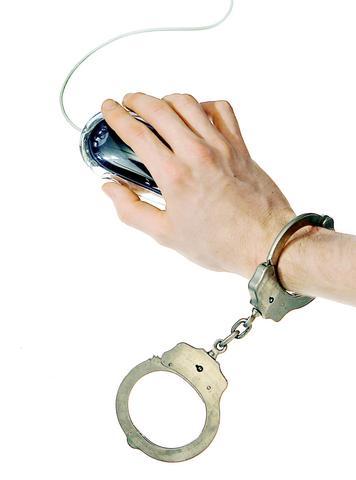Some people may well be intimidated by the 261 lawsuits that the music industry has filed against Internet users it says are illegally sharing songs.
But hundreds of software developers are racing to create new systems, or modify existing ones, to let people continue to swap music -- hidden from the prying eyes of the Recording Industry Association of America (RIAA), or from any other investigators.

PHOTO: NY TIMES
"With the RIAA trying to scare users around the world, the developer community is pumping up to create networks which are safer and more anonymous," said Pablo Soto, a developer in Madrid who designed the software for two file-sharing systems, Blubster and Piolet.
Some experts wonder if the industry's efforts will create more trouble for it than ever. "The RIAA is breeding antibiotic-resistant bacteria," said Clay Shirky, a software developer who teaches new media at New York University.
Blubster, which has an estimated quarter-million users, already uses technology to make eavesdropping more difficult, Soto said. Its next version will encrypt files so they can be decoded only by their intended user.
Other systems are sending files on more circuitous Internet routes instead of, or in addition to, using encryption. And some developers hope to replace the current systems, which connect millions of users, with private file-sharing networks -- speakeasies that may be too small for the industry to find.
The developers of the new systems say there is nothing illegal about writing software that helps people keep secrets. US courts have held that file-sharing software may not be banned if it has both legitimate and illegal uses.
The Recording Industry Association of America has said that it is unconcerned about the increasing anonymity of file sharing. The stated purpose of its lawsuits is not to catch every hard core music pirate, but to show millions of casual file sharers that what they are doing is illegal.
In addition, none of the new methods offers perfect anonymity, experts say. Yet many of the new systems are likely to make the recording industry work harder to find file traders.
Private file sharing stems from academic work on encryption and data security over the last decade. One system is Freenet, introduced in 1999 by Ian Clarke. It allows people to publish files to be used by others, with technology meant to keep the source anonymous.
"Everyone said the Internet was an anarchistic thing through which anyone could say anything," Clarke said. "But in reality it is incredibly easy to monitor what is going on on the Internet. I was interested in creating a system that would preserve anonymity."
Freenet is similar to other file-sharing services in that users make part of their hard drives available to hold content to be downloaded by other users. But all the files are encrypted so no one knows what files are on a given machine. Requests to download a file are also encrypted.
Freenet has been a way to disseminate banned political tracts and has been used by people who want to share illegal content like child pornography. Clarke says he is willing to help people send files illegally if he can also prevent political censorship. "I am an absolutist on free speech," he said.
Freenet, however, is slow and hard to use, and it requires knowing a specific file name. As a result, it has not been a viable alternative to music-sharing services like KaZaA. Developers in Germany are creating a program called Frost meant to make Freenet easier to use.
Another file-sharing model is for business users who want to collaborate while protecting secrets from competitors. "The needs of businesses and the needs of file traders are the same," Shirky said. "I want a secure way to send you a three megabyte PowerPoint file with no way for anyone else to see it. That is not different from an MP3 file."
Software by companies like Groove Networks creates private file networks for specified users. Groove, which can cost $69 or more per user, is not widely employed by music sharers. But a program called Waste is attracting the interest of music traders who want to create "darknets," as private file-sharing communities are known.
Waste was written by Justin Frankel, who works for the Nullsoft unit of America Online. It was posted on Nullsoft's site one day last May and removed the next , although not fast enough to keep copies from circulating on the Web. (AOL's corporate cousin, Warner Music, is a backer of the RIAA's campaign against file sharing.) Frankel and AOL did not return calls seeking comment.
Investigators for the music industry acknowledge that some of these technologies may make their jobs more difficult, but they suggest that users may not want to take advantage of them.
"The thing about darknets is that the users show more culpability than people who simply use peer-to-peer," said Randy Saaf, referring to peer-to-peer sharing systems like KaZaA. Saaf is chief executive of MediaDefender Inc, a music technology company that does work for the record industry. "When people are found to be using them, they will face stiffer penalties."
Meanwhile, older file-sharing services do not want to lose users to darknets or other newcomers. Many of them are trying to add features they say will protect privacy. Streamcast networks, the creator of Morpheus, introduced a feature this summer that lets users relay files by way of intermediary computers known as proxy servers -- a technique that can help obscure the path between the source of the file and the person who downloads it.
Proxy servers and similar methods can be an effective way to hide, said Stuart Schechter, a Harvard security researcher. But, he said, there is nothing to stop the recording industry from creating proxy servers as so-called honey pots to serve as decoys and gather information on users. "The problem with any of these systems is how do you decide who to trust," he said.

From the last quarter of 2001, research shows that real housing prices nearly tripled (before a 2012 law to enforce housing price registration, researchers tracked a few large real estate firms to estimate housing price behavior). Incomes have not kept pace, though this has not yet led to defaults. Instead, an increasing chunk of household income goes to mortgage payments. This suggests that even if incomes grow, the mortgage squeeze will still make voters feel like their paychecks won’t stretch to cover expenses. The housing price rises in the last two decades are now driving higher rents. The rental market

July 21 to July 27 If the “Taiwan Independence Association” (TIA) incident had happened four years earlier, it probably wouldn’t have caused much of an uproar. But the arrest of four young suspected independence activists in the early hours of May 9, 1991, sparked outrage, with many denouncing it as a return to the White Terror — a time when anyone could be detained for suspected seditious activity. Not only had martial law been lifted in 1987, just days earlier on May 1, the government had abolished the Temporary Provisions Effective During the Period of National Mobilization for Suppression of the Communist

When life gives you trees, make paper. That was one of the first thoughts to cross my mind as I explored what’s now called Chung Hsing Cultural and Creative Park (中興文化創意園區, CHCCP) in Yilan County’s Wujie Township (五結). Northeast Taiwan boasts an abundance of forest resources. Yilan County is home to both Taipingshan National Forest Recreation Area (太平山國家森林遊樂區) — by far the largest reserve of its kind in the country — and Makauy Ecological Park (馬告生態園區, see “Towering trees and a tranquil lake” in the May 13, 2022 edition of this newspaper). So it was inevitable that industrial-scale paper making would

Hualien lawmaker Fu Kun-chi (傅?萁) is the prime target of the recall campaigns. They want to bring him and everything he represents crashing down. This is an existential test for Fu and a critical symbolic test for the campaigners. It is also a crucial test for both the Chinese Nationalist Party (KMT) and a personal one for party Chairman Eric Chu (朱立倫). Why is Fu such a lightning rod? LOCAL LORD At the dawn of the 2020s, Fu, running as an independent candidate, beat incumbent Democratic Progressive Party (DPP) lawmaker Hsiao Bi-khim (蕭美琴) and a KMT candidate to return to the legislature representing